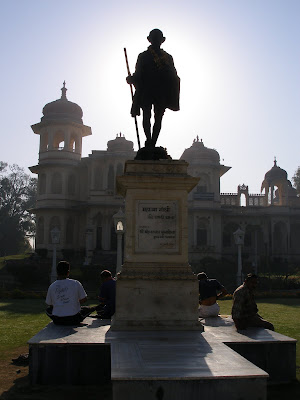While I still don't have pictures from my trip to India, I can't help spilling the beans on the most striking and surprising aspect, especially after reading Tyler Cowen's poignant
dissection of Jeff Sach's book
Common Wealth: Economics for a Crowded Planet. Per Tyler:
I am much more pessimistic, partly for reasons Sachs already outlines. I won't recapitulate all of my previous writings on the topic (follow the links here), so let me give a kind of "splat" response: Chinese CO2 emissions are much worse than we had thought, China resists outside pressure, Chinese governance is often of very poor quality, China is currently subsidizing energy consumption, China thinks it is our problem to solve, China won't automatically keep on becoming prosperous, the super eco-conscious Europeans in fact haven't made much of a dent in the problem in terms of percentage change, the U.S. has done better on carbon emissions than most of the Kyoto signatories, the price of oil rose fivefold in a relatively short period of time without much helping, a gradual increase in carbon taxes (in a Hotelling model) can lead to more extraction today thus worsening the problem, and if the rich countries massively cut their carbon consumption the prices of coal and oil would plummet and the incentive for someone to buy and smoke the stuff will be all that much stronger.
Much of this resonates with my experience in India. It was not a romantic vacation, it probably took years off my life. The air quality was so bad that in three weeks of travelling I never once observed anything like a crystal blue sky, really it looked more like a nuclear winter (believe me, pictures will confirm this). There was a severe drought pushing its way eastward from the Thar desert, effecting the entire northeast region in which I travelled, Mumbai, Delhi, and Rajasthan primarily. For instance, the Bharatpur wetlands bird sanctuary, a World Heritage site, done
dried up. Read some of these ridiculous Rajasthan tourism sites for
Ranakpur and
Udaipur, the "romantic city of lakes" and "Venice of the East," etc. More like a dust bowl.
North of Mumbai, in the state of Maharashtra, we observed streets lined with trees, their trunks painted red and white to indicate government protection. The rest of the countryside was barren. In Mumbai and Delhi the problem was more due to streets jammed with all manner of transport and refuse, ox drawn carts, cows, auto-rickshaws, and dump-trucks serving the booming economy. Eventually, I developed terrible asthma and a hacking cough which only subsided once I reentered the 1st world.
One optimistic view, propounded by the likes of Jeff Sachs, is that India's environmental problems can be corrected through some combination of regulation, carbon taxes, and subsidies for alternative energy technologies. Another optimistic view is that this is but a temporary phase that all industrializing economies go through. Compare
London in the 1950s to today. That is, eventually India will get rich and then enjoy the luxury of harping about the environment.
Like Tyler, I now have a more pessimistic view. Jeff Sachs places too much faith in government, especially 3rd world governments. I spent a few days with
Vivek Pandit, a politician of sorts, who has spent 20 years battling slavery in India. He lives like the Godfather on a compound outside of Mumbai, surrounded by body guards and adoring tribals and
Dalits who he's helped free. The love they have for him is undeniable. And he has succeeded in many ways, particularly by holding politicians feet to the fire and making them accountable to the law. While I was there he took a group of tribals to the unemployment office to get their promised benefits. After waiting in line all day, in the end most were denied because they couldn't read the application.
The point is that government, especially in a place like India, serves those who can take advantage of it. As such, it becomes a tool for special interests, perpetuated my the misplaced hopes of the disadvantaged. I simply don't trust the Indian government to produce effective environmental policy.
Jeff Sachs is right about one thing, that the solution will likely come in the form of new technology from European countries, the U.S., and Japan. But how many years will this take? And as the situation worsens, how many years will it take the largely illiterate and disadvantaged lower castes of India to figure out a) what's causing pollution, b) what are the long term effects, and c) how to avoid it? I'm with Jared Diamond on this:
environmental collapse is a distinct possibility.






